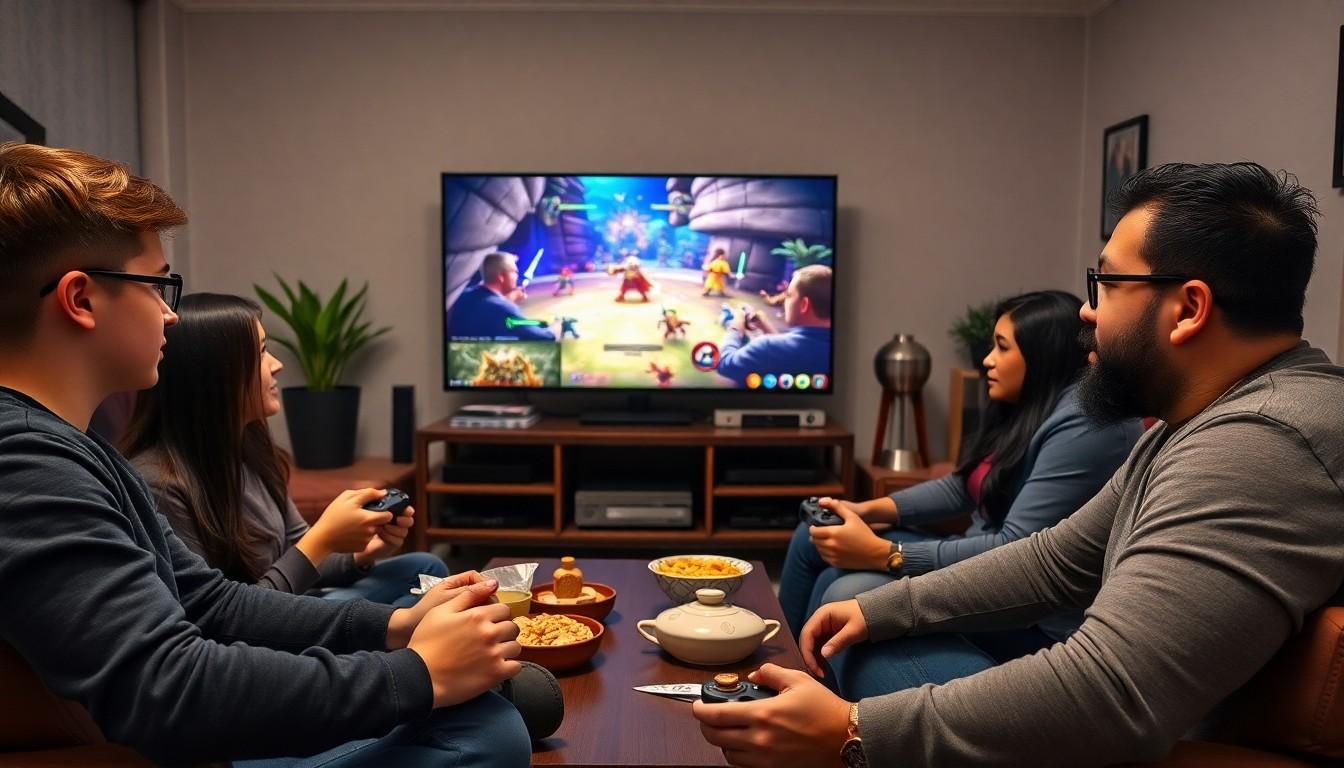In a world where solo quests can feel a bit lonely, co-op RPG games swoop in like a trusty sidekick ready to save the day. Imagine battling fierce dragons or exploring enchanted forests, all while sharing the glory (and the loot) with friends. These games transform gaming into a social adventure, turning couch potatoes into valiant heroes—one pizza slice at a time.
Table of Contents
ToggleOverview of Co Op RPG Games
Co-op RPG games combine storytelling with collaborative gameplay. Players engage in a shared narrative, creating dynamic interactions. These games foster teamwork, as groups tackle challenges together.
Character customization plays a significant role in co-op RPGs. Each player can develop a unique hero, allowing for diverse playstyles. This personalization enhances the gaming experience by encouraging players to find their strengths.
Combat mechanics vary widely among co-op RPGs. Many games feature strategic turn-based battles, requiring players to coordinate their moves. Others embrace real-time action, demanding quick reflexes and sharp communication.
Exploration becomes more captivating in these games. Players can discover hidden treasures and lore while journeying through expansive worlds. The shared experience of exploring enhances friendships and promotes cooperation.
Rewards systems contribute significantly to player satisfaction. Often, players earn loot or experience points together, reinforcing their joint efforts. This mechanic encourages players to work towards common goals, heightening their investment in the game.
Many co-op RPGs include quests that necessitate collaboration. Completing objectives together not only strengthens player bonds but also creates memorable moments. Whether solving puzzles or battling formidable foes, the cooperative spirit fuels engagement.
Overall, co-op RPG games create a rich, immersive environment. They blend social interaction with compelling gameplay. Players get to build connections while embarking on thrilling adventures filled with excitement and teamwork.
Benefits of Playing Co Op RPG Games

Co-op RPG games offer numerous advantages that enhance both gameplay and social dynamics. Players can significantly improve their teamwork skills and social connections through shared experiences.
Strengthening Teamwork Skills
Working together in co-op RPGs fosters essential teamwork skills. Players face challenges that require coordination and collaboration. Each member contributes unique abilities to overcome obstacles, emphasizing the importance of strategy. Learning to communicate effectively becomes vital as players share tactics and develop plans. Success often hinges on the team’s performance, reinforcing mutual trust. These experiences translate to real-life teamwork, enhancing interpersonal skills outside the game environment. Engaging in joint quests leads to a deeper understanding of group dynamics, preparing players for collaborative tasks in various areas.
Enhancing Social Connections
Co-op RPGs bolster social connections among players. Teaming up with friends or meeting new players creates strong bonds through shared adventures. Engaging in conversations during gameplay often leads to lasting friendships. Celebrating victories and strategizing during defeats cultivates a sense of community. Players can support each other through challenges, which strengthens relationships. Many players maintain friendships beyond the game, organizing future gaming sessions or connecting on social media. These connections result in a more fulfilling gaming experience, enhancing engagement and enjoyment.
Popular Co Op RPG Games
Co-op RPGs attract players with immersive gameplay and collaborative experiences. Here’s a look at several popular titles within this genre.
Game 1: Overview and Features
Divinity: Original Sin 2 offers a rich narrative combined with tactical turn-based combat. Players create unique characters from various races, each with distinct abilities and backgrounds. This game emphasizes teamwork, allowing players to combine skills for powerful attacks. The environment plays a significant role, with destructible elements that influence battles. Exploration reveals secrets, lore, and quests, fostering a deeper connection among players as they uncover the story together.
Game 2: Overview and Features
Monster Hunter: World focuses on cooperative gameplay centered around epic hunts. In this game, players team up to track down and defeat massive creatures in diverse environments. Character customization enhances the experience, enabling players to choose from various classes and equipment. Communication is vital for strategizing during hunts, ensuring players coordinate their actions effectively. Rewards from quests promote teamwork, allowing players to craft better gear and tackle increasingly challenging monsters together.
Game 3: Overview and Features
Borderlands 3 blends shooter mechanics with RPG elements within a vibrant universe. Players navigate through unique planets, encountering various enemies and completing quests. The game emphasizes loot collection, with an extensive array of weapons and gear that players can share or trade. Story missions and side quests offer opportunities for players to cooperate, develop their characters, and enhance their skills. The humor and engaging dialogue further enrich the experience, fostering a sense of community among player teams.
Tips for Enjoying Co Op RPG Games
Co-op RPG games thrive on collaboration and communication. Players can enhance their experience by implementing effective strategies and understanding their character roles.
Communication Strategies
Effective communication serves as the backbone of successful gameplay in co-op RPGs. Players should utilize voice chat or in-game messaging to coordinate strategies. Clear communication about goals ensures everyone is aligned during quests. Sharing information about enemy locations, health statuses, or available resources fosters a collaborative environment. Players can also designate a leader who organizes strategies, keeping discussions focused on tactics. Encouraging open dialogue allows for immediate feedback, leading to quick adaptations during combat. Throughout the adventure, maintaining a positive tone reinforces team morale, as encouragement enhances the collective experience.
Character Roles and Responsibilities
Understanding character roles enriches the gameplay experience. Each character contributes unique abilities, shaping the team’s strategy. Players should define their roles based on strengths, like tanking, healing, or dealing damage. Tanks absorb attacks, allowing damage dealers to focus on defeating enemies. Healers maintain party health, ensuring survivability during challenging encounters. Damage dealers maximize damage output, targeting enemies effectively. Assigning specific responsibilities helps streamline combat and exploration, ensuring that each player knows their tasks. Players can adapt their playstyles based on team composition, allowing for dynamic strategies in various situations. When all roles work harmoniously, the team achieves greater success and enjoyment.
Conclusion
Co-op RPG games offer an unparalleled blend of adventure and camaraderie that captivates players. By teaming up with friends or meeting new allies, gamers can experience the thrill of exploration and the joy of shared victories. The collaborative nature of these games not only enhances gameplay but also strengthens social bonds, making each quest memorable.
As players navigate diverse worlds and tackle challenges together, they develop essential teamwork skills that extend beyond the screen. With a variety of titles available, each offering unique mechanics and narratives, there’s a co-op RPG for every type of player. Embracing these experiences leads to unforgettable moments and lasting friendships, solidifying the appeal of co-op RPGs in the gaming community.



